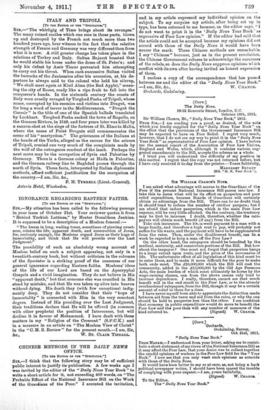ITALY AND TRIPOLI.
[TO THE EDITOR OF THE "SPECTATOR."]
SIR,—" The whirligig of Time brings about its revenges." The many ruined castles which one sees in these parts, blown up and destroyed by the French not much more than two hundred years ago, bear witness to the fact that the relative strength of France and Germany was very different then from what it is now. A still greater change has taken place in the relations of Turkey and Italy. Sultan Bajazet boasted that he would stable his horse under the dome of St. Peter's ; and only his defeat by Amir Timur prevented him attempting to carry out his threat. When each successive Sultan visited the barracks of the Janissaries after his accession, at his de- parture he always said to the colonel who held his stirrup, " We shall meet again at Kizil Alma (the Red Apple)," mean- ing the city of Rome, ready like a ripe fruit to fall into the conqueror's hands. In the sixteenth century the coasts of Italy were cruelly ravaged by Torghud Pasha of Tripoli, whose name, corrupted by his enemies and victims into Dragut, was for long a word of terror in the Mediterranean. "Dragut the Corsair " is the title of one of the Spanish ballads translated by Lockhart. Torghud Pasha sacked the town of Rapallo, on the Genoese Riviera, in 1549, and four years later was killed by a cannon-shot at the siege of the fortress of St. Elmo in Malta, where the name of Point Dregate still commemorates the scene of his "martyrdom." The grievances of the Italians at the hands of the Turks, alleged as the excuse for the seizure of Tripoli, remind one very much of the complaints made by the wolf of the outrageous conduct of the lamb. Perhaps the next move may be the occupation of Syria and Palestine by Germany. There is a German colony at Haifa in Palestine, and the German. railway line to Baghdad passes through the north of Syria. These facts, interpreted by Italian diplomatic methods, afford sufficient justification for the occupation of the country.—I am, Sir, &c.,






































































 Previous page
Previous page